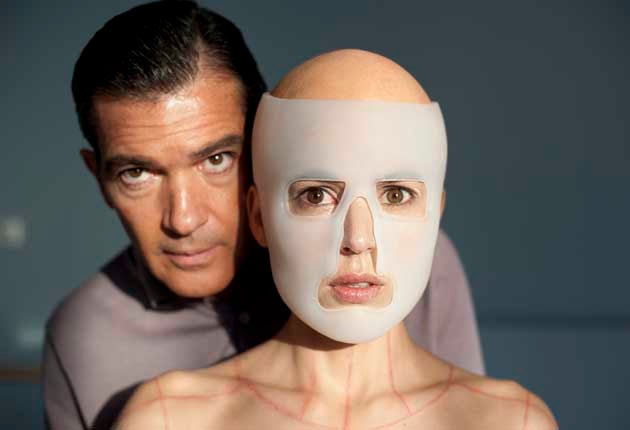The Skin I Live In, Pedro Almodovar, 118 mins (15)
Almodovar's latest is a creepy tale of surgery and obsession

There's a scene in Pedro Almodovar's last feature Broken Embraces in which a film director casually improvises a story about vampires.
It was as if Almodovar wanted us to know that spinning tall tales was something he could do while idly strolling down the calle – yet the story was so banal, it seemed a covert admission that his inventiveness was deserting him. In response to this exhaustion, perhaps, the Spanish maestro has turned to someone else's material for his new film.
The tactic recharged his batteries once before, in 1997's Live Flesh, based on Ruth Rendell, and now he's adapted Tarantula, an overripe slice of sensationalism by French thriller writer Thierry Jonquet. The Skin I Live In feels unlike any other Almodovar film – a quasi-horror exercise that's improbably august and elegant. Yet it's also uncannily familiar – an Almodovar film to the hilt, and even oppressively so.
The story begins in a sumptuously appointed mansion in Toledo, where pioneering plastic surgeon Robert Ledgard (Antonio Banderas, reunited with Almodovar after 21 years) has a private operating theatre. The mansion is also home – or prison – to Ledgard's special patient, the beautiful Vera (Elena Anaya) who practises yoga in a flesh-coloured catsuit and creates sculptures from ripped-up dresses. Ledgard likes to watch Vera on giant surveillance screens, where she appears stretched out naked like a Bill Viola video remake of the Rokeby Venus. Vera appears to have a romantic or erotic attachment to Ledgard, yet he nervously recoils from her embrace.
Some obscure nexus of taboos operates between Ledgard and the patient who, we begin to realise, is his creation. Ledgard has devised a genetically modified human skin, and Vera is his guinea pig. Anaya's own silky skin, uncannily smoothed to a perfect plastic finish through the film's own digital "airbrushing", is one of the more unnerving elements.
The premise is set up with absolute seriousness and Hitchcockian precision. The brooding Ledgard is compellingly established as both menacing maniac and tragic anti-hero, while Anaya's Vera is enticingly, affectingly opaque. But the point soon comes when Almodovar can no longer repress his penchant for riotous absurdity, and the story jerks into more strident gear with the arrival of a Brazilian robber, in an outlandish carnival tiger costume, of the errant son of Ledgard's housekeeper Marilia (Marisa Paredes at her most baleful). After that, Almodovar leads us somewhere else entirely, in an initially baffling digression involving Ledgard's disturbed daughter (Blanca Suarez) and a young window dresser (Jan Cornet) who catches her eye at a wedding. Beyond that, I can say no more, for fear of disclosing a twist so outré that you will either gasp or giggle helplessly when Banderas reveals it, with priceless solemnity, in a single (and highly technical) word.
One sequence shows Ledgard delicately patching together a mosaic of his miracle skin, meticulously placing patches on a mannequin; this is the sort of surgical artisanship, Almodovar is telling us, that defines his own craft. The film's execution is as silky as Anaya's CGI skin, or as the shimmering quasi-techno score by Alberto Iglesias. Shot by Jose Luis Alcaine, the film is aesthetically precise to the point of fetishism: consider all those close-ups of gleaming surgical instruments, or of bees, cockroaches and Petri dishes.
The more lurid, even trashy, the director's material, the more he counterpoints it with high-culture references (here, to sculptor Louise Bourgeois and writer Alice Munro). Ledgard's walls are hung with classical Venuses and modern paintings so opulently that this hyper-designed film resembles David Cronenberg body horror reconceived to the specifications of Wallpaper* magazine. (The weirdest thing on show is the vacuum cleaner built seamlessly into a wall, but I couldn't help wondering how you'd empty it.)
The Skin I Live In feels uncannily familiar, as if sutured together from a range of source material – Pygmalion, Frankenstein, Vertigo, the seminal 1960 surgical chiller Eyes Without a Face. But most of all, the story – taking in themes of secret family relations, hereditary madness, masks, mourning and revenge – resounds with echoes from across the Almodovar oeuvre, most obviously the SM-themed Tie Me Up! Tie Me Down!, in which Banderas starred. Indeed, some of the director's most cherished obsessions prove to be more pertinent than you might at first suspect. The effect is to intensify the claustrophobic, even airless atmosphere.

Watch Apple TV+ free for 7 days
New subscribers only. £8.99/mo. after free trial. Plan auto-renews until cancelled

Watch Apple TV+ free for 7 days
New subscribers only. £8.99/mo. after free trial. Plan auto-renews until cancelled
As for the sexual politics, they're as queasy as those of Tie Me Up!. I doubt any screen actress has been as literally objectified as Anaya, given her constantly displayed physicality and vulnerability, and the sense conveyed that Vera is pure body, pure surface with an unknowable interior. Anaya nevertheless works brilliantly to give her character presence, suggesting a secret self beneath the sleek elasticity.
Hugely involving as the film is, it rather deflates (like the blow-up doll that Vera resembles) as it heads towards a bathetic final scene. It's perhaps appropriate that a film about skin should ultimately feel superficial. There's little of the emotional charge that made Volver or Talk to Her transcend the one-man genre that is Almodovar's cinema. But for sheer bewitching strangeness, The Skin I Live In is unmissable, and under your skin it will certainly get.
Next Week:
Jonathan Romney explores the darker corners of British cinema with thriller Kill List
Subscribe to Independent Premium to bookmark this article
Want to bookmark your favourite articles and stories to read or reference later? Start your Independent Premium subscription today.

Join our commenting forum
Join thought-provoking conversations, follow other Independent readers and see their replies